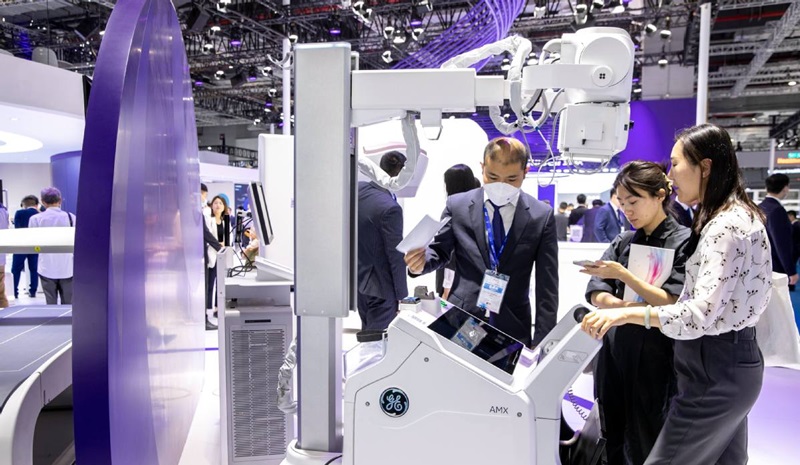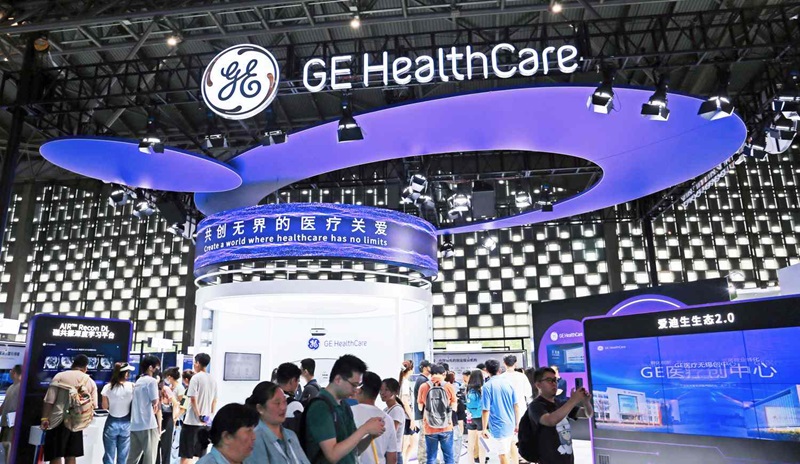GE HealthCare (GEHC) Q2 Results Surpass Expectations, Improved Net Margin
General Electric’s healthcare division, GE Healthcare (GEHC), has reported its Q2 results which have not only met but surpassed market expectations. This stellar performance can be attributed to a significant improvement in net profit margins, demonstrating an uptick in the company’s overall financial health. The robust performance can be seen as a direct result of the company’s strategic focus on improving operational efficiency and cost management, despite the challenging market conditions due to the ongoing global pandemic.
The results have shown that GE Healthcare’s innovative solutions continue to resonate with the market, driving increased demand for their medical imaging, biopharmaceutical manufacturing technologies, and healthcare systems. In addition, the company’s commitment to delivering high-quality healthcare solutions while maintaining cost-effectiveness has contributed to the improved net margin.
The exceptional Q2 results also reflect the successful implementation of GE Healthcare’s strategic initiatives, which have enabled the company to strengthen its market position, enhance customer relationships, and create sustainable growth opportunities. These initiatives include diversifying product portfolio, investing in digital and emerging technologies, and streamlining operations for better cost-effectiveness.
The company also highlighted the strong performance of its Pharmaceutical Diagnostics business, which demonstrated robust growth due to the increasing demand for diagnostic imaging agents. The Life Sciences business also showed significant strength, driven by the growing demand for bioprocessing solutions, particularly in the cell and gene therapy space.
Furthermore, the company’s ongoing efforts to optimize its portfolio and strategically invest in high-growth areas have paid off. The strong Q2 results are indicative of the effectiveness of this strategy, with the company achieving growth across several sectors. The improved net margin is particularly noteworthy, as it indicates that the company is not only growing its revenue but also improving its profitability.
Overall, the Q2 results have underscored GE Healthcare’s resilience in the face of challenging market conditions, and its ability to not only adapt but also thrive. It is clear that the company’s relentless focus on innovation, operational efficiency, and strategic investments are paying dividends. Looking ahead, GE Healthcare is well-positioned to continue its growth momentum, driven by its robust product portfolio, strong market presence, and strategic initiatives.
In conclusion, GE Healthcare’s Q2 results represent a significant achievement for the company, highlighting its financial strength and strategic direction. The improved net margin is a testament to the company’s focus on operational efficiency and cost management. With a robust product portfolio, strategic investments, and a strong market presence, GE Healthcare is poised for continued success in the future.

Strong Q2 Earnings Highlight GE HealthCare’s Financial Growth
GE Healthcare has demonstrated noteworthy financial growth as underlined by their robust Q2 earnings. This growth is a testament to the company’s strategic decisions and operational efficiencies which have resulted in a surge in profitability. The company’s Q2 results highlight the strength of its diverse portfolio of products and solutions, which cater to a wide range of healthcare needs. Notably, the company’s life sciences segment has been a key driver of growth, backed by high demand for its cell therapy technologies and bioprocess solutions.
Similarly, the healthcare systems segment has shown a robust performance with strong sales in ultrasound and mobile diagnostics. These results have been further bolstered by the successful launch of innovative products and solutions in the market, as well as the continuous efforts of the company to expand its footprint in emerging markets. In addition, GE Healthcare’s commitment to cost management and operational efficiency have played a pivotal role in enhancing its profitability.
The financial performance of GE Healthcare during Q2 is not only a reflection of its strong fundamentals but also a clear indication of its potential for sustained growth. This impressive financial growth suggests that the company is well-positioned to navigate the challenges of the evolving healthcare landscape and capitalize on the opportunities that lie ahead. With its strategic focus on innovation, customer-centricity, and operational efficiency, GE Healthcare is poised to continue its growth trajectory in the foreseeable future. This robust Q2 earnings report underscores the financial health of the company and its capacity to deliver value to its shareholders, customers, and employees.
Net Margin Increase Signals Operational Efficiency for GE HealthCare
GE Healthcare’s net margin increase is a clear indication of enhanced operational efficiency in the organization. This financial metric, which is essentially the percentage of revenue remaining after all operating expenses, interest, taxes, and preferred stock dividends have been deducted, serves as a reliable measure of a company’s profitability and operational efficiency. A higher net margin indicates that the company is effectively controlling its costs and deriving maximum value from its revenue streams, a key indicator of efficient operations.
GE Healthcare’s improved net margin suggests that the company has been successful in optimizing its operations, reducing unnecessary costs, and enhancing the productivity and efficiency of its resources. It reflects that the company is not just focused on increasing revenue, but also on cost control and efficient resource utilization, which are essential for sustainable growth and long-term profitability.
The increase in net margin can be attributed to several factors. These may include strategic cost management measures, innovation in operational processes, effective pricing strategies, and successful implementation of productivity enhancement initiatives. The company’s investments in research and development, technological advancements, and process improvements may also be yielding positive results, contributing to cost savings and efficiency gains.
Furthermore, the net margin increase may also signal that GE Healthcare is experiencing strong demand for its products and services, which is driving revenue growth and improving profitability. It may also indicate that the company is successfully leveraging its competitive advantages, such as superior technology, strong brand, and extensive market reach, to increase its market share and enhance financial performance.
In conclusion, the rise in GE Healthcare’s net margin is a positive development, signaling improved operational efficiency and profitability. It underscores the company’s ability to effectively manage its operations and resources, control costs, and maximize value creation, which are crucial for its future growth and success.

Market Reaction to GE HealthCare’s Q2 Performance
The market response to GE Healthcare’s Q2 performance was decidedly mixed. On one hand, investors were pleased to see the company’s revenue surpass expectations, showcasing the robustness of its core businesses amidst an unpredictable economic climate. This performance was driven by the strong demand for pharmaceutical diagnostics, and bio-pharma products which are integral to the ongoing research and treatment of various medical conditions. The sector also saw a rise in profit margins, buoyed by disciplined cost management and operational efficiency gains.
However, some analysts expressed concerns about the company’s ability to sustain this momentum, especially given the uncertain trajectory of the global pandemic and its potential impact on healthcare spending. Additionally, despite the promising revenue figures, the corporation’s overall earnings fell short of the market consensus, leading to a dip in its stock price. This shortfall was primarily due to the increased costs associated with the global supply chain disruptions and the lingering effects of the pandemic on its operations.
Furthermore, the market reaction was somewhat tempered by concerns about GE Healthcare’s long-term growth prospects. Some stakeholders questioned whether the company’s current strategy, which relies heavily on pharmaceutical diagnostics and bio-pharma, is sustainable in an increasingly competitive and rapidly evolving healthcare landscape. There was also speculation about potential strategic shifts following the announced spin-off of its healthcare unit, with some investors expressing uncertainty about the future direction of the company.
In conclusion, while GE Healthcare’s Q2 performance demonstrated resilience and operational excellence in certain areas, the market reaction underscored the challenges that the company faces in maintaining its growth trajectory amidst ongoing uncertainty. The performance elicited a complex response from the market, highlighting both the strengths of its current strategy and the need for further strategic adaptations to navigate a dynamic and unpredictable business environment.
Key Drivers Behind GE HealthCare’s Earnings Beat
GE Healthcare’s recent earnings beat can largely be attributed to several key factors that helped the company exceed expectations. Firstly, the increased demand for its pharmaceutical diagnostics products, primarily driven by the ongoing global pandemic, significantly boosted revenue streams. The company’s imaging services also saw a substantial rise in demand as health systems across the world ramped up their diagnostic capabilities in response to the pandemic, further contributing to increased earnings.
Secondly, GE Healthcare’s continued focus on technological innovation and the development of cutting-edge medical equipment has also played a critical role in its financial success. This commitment to staying at the forefront of medical technology has not only enabled the company to meet the growing needs of healthcare providers but also helped it gain a competitive edge in the market, thereby driving its earnings growth.
In addition, the company’s strategic acquisitions have also proven to be fruitful. The acquisition of companies like Prismatic Sensors AB, a Sweden-based start-up specializing in photon counting detectors, has amplified GE Healthcare’s capabilities and product offerings, resulting in enhanced revenue.
Furthermore, the company’s rigorous cost-control measures and operational efficiency improvements have also aided in improving its profit margins. Through initiatives such as lean management and simplification of processes, the company has managed to reduce operating costs and increase productivity, thus positively impacting the bottom line.
Lastly, GE Healthcare’s robust portfolio of products and services has helped it maintain a steady revenue stream, even in challenging market conditions. The company’s wide range of offerings, from medical imaging to pharmaceutical diagnostics, has allowed it to cater to a diverse customer base and maintain a steady flow of revenue.
In conclusion, a combination of strategic acquisitions, technological innovation, rigorous cost-control measures, and a robust product portfolio has driven GE Healthcare’s earnings beat. The company’s ability to adapt to changing market conditions and consistently meet the evolving needs of its customers has played a pivotal role in its financial success.

Future Projections for GE HealthCare Post Q2 Success
Following an impressive Q2 performance, GE Healthcare’s future projections appear promising. A key player in the global healthcare sector, the company’s robust performance is attributed to strategic focus on technological advancements, increased demand for healthcare services, and a dynamic portfolio that caters to diverse market needs. Analysts forecast that GE Healthcare’s positive trajectory will continue, driven by the rising global demand for improved healthcare infrastructure, innovative medical technologies, and advanced diagnostic solutions.
The company’s ability to leverage its digital and analytical capabilities to provide integrated healthcare solutions is expected to further fuel growth. This includes the development of artificial intelligence tools and data analytics to optimize patient care and operational efficiency. Additionally, GE Healthcare’s strong emphasis on research and development activities is projected to yield innovative solutions, contributing to the company’s future growth.
The company’s prospects are bolstered by the fact that healthcare is a priority for governments worldwide, leading to increased investment in the sector. This global trend, coupled with the ever-growing demand for quality healthcare, sets the stage for GE Healthcare’s continued success in the market. Moreover, the company also stands to benefit from the ongoing shift towards personalized medicine and home healthcare solutions, aligning with its vision of creating a healthier world.
While the economic uncertainty caused by the pandemic cannot be ignored, GE Healthcare’s resilience, demonstrated by its Q2 performance, is a testament to the company’s adaptability and strategic foresight. As the world continues to grapple with the healthcare challenges brought about by the pandemic, the need for advanced healthcare technologies and solutions is more apparent than ever. Thus, GE Healthcare’s commitment to innovation and its comprehensive portfolio positions it well to meet these global healthcare needs, paving the way for a promising future.
